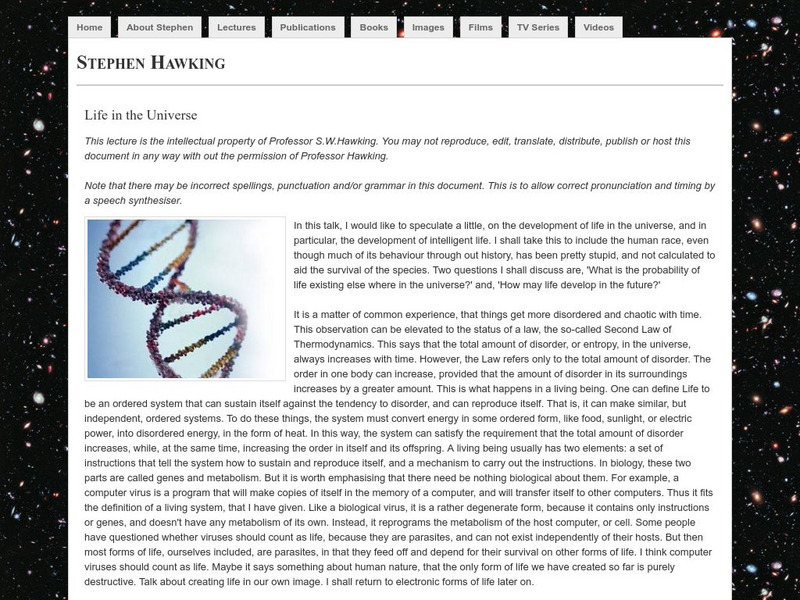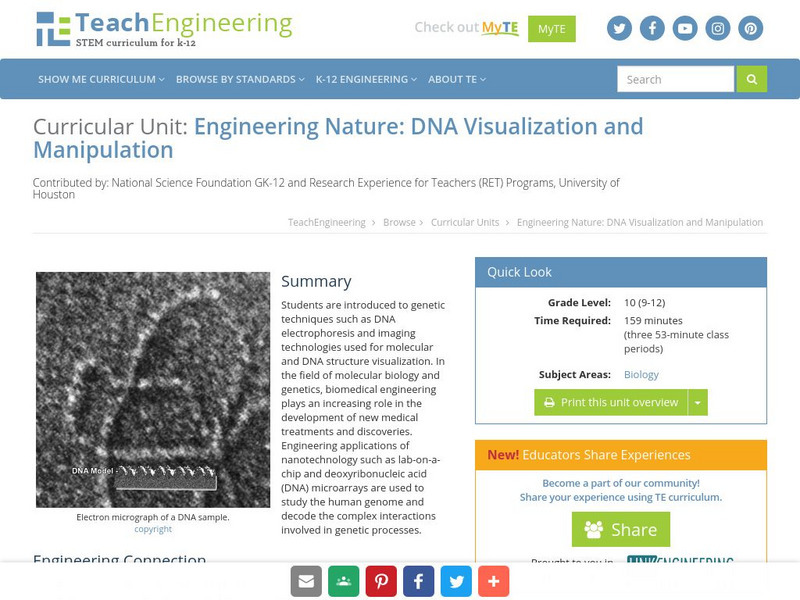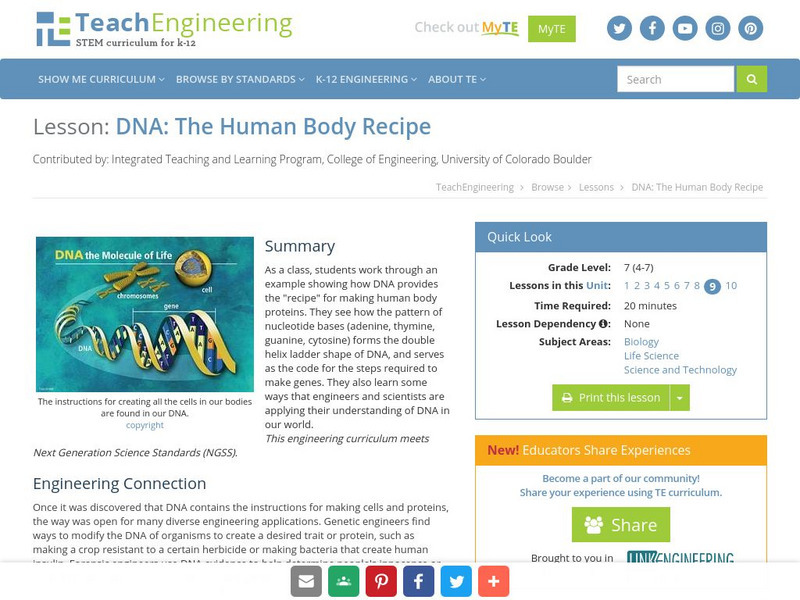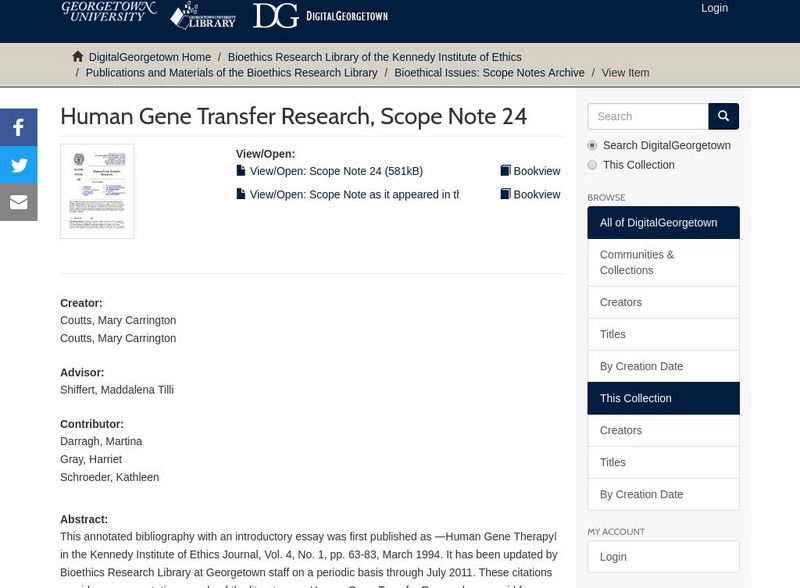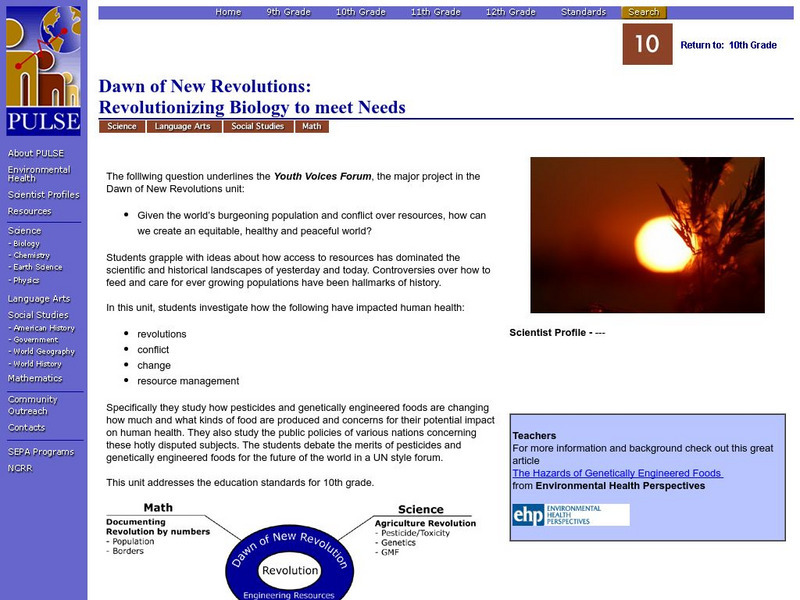OneWorld UK
One World: Tiki the Penguin: Genetic Engineering: Whose Genes?
Come along with Tiki the Penguin as he discovers what makes you a human or him a penguin! This site details some of the major issues relative to genetics - such as genetic engineering - in a way that is interesting and relevant to kids.
National Institutes of Health
Ncbi: Human Genome Resources
This site covers information on all the human chromosomes, has interesting illustrations as well.
TeachEngineering
Teach Engineering: What's Dominant?
In a class discussion format, the teacher presents background information about basic human genetics. The number of chromosomes in both body cells and egg and sperm cells is covered, as well as the concept of dominant and recessive...
Oak Ridge National Laboratory
Human Genome Project Overview
Explains the goals of the Human Genome Project. It also explains some of the ethical, legal and social challenges associated with this new technology.
PBS
Pbs Learning Media: What's Coming to Dinner? Genetically Modified Foods
Browse through a table full of genetically modified (GM) foods to see what's available now and what's to come. From FRONTLINE/NOVA: "Harvest of Fear."
Other
Stephen W. Hawking: Lectures: Life in the Universe
This lecture covers the topic of life now and into the future, including the role genetic engineering will play.
TED Talks
Ted: Ted Ed: Printing a Human Kidney
Surgeon Anthony Atala demonstrates an early-stage experiment that could someday solve the organ-donor problem: a 3D printer that uses living cells to output a transplantable kidney. Using similar technology, Dr. Atala's young patient...
Cold Spring Harbor Laboratory
Dna From the Beginning
At DNA from the Beginning, choose from classical genetics, molecules of genetics, genetic organization and control. Each concept is explained through animation, an image gallery, video interviews, biographies and links.
Biotechnology Institute
Biotechnology Institute: Your World: Planting for the Future [Pdf]
This Biotechnology Institute's issue explores plant-made pharmaceuticals, using plants to manufacture useful proteins. It's one of the many aspects of biotechnology--the use of living organisms to benefit humanity.
TeachEngineering
Teach Engineering: Engineering Nature: Dna Visualization and Manipulation
Students are introduced to genetic techniques such as DNA electrophoresis and imaging technologies used for molecular and DNA structure visualization. In the field of molecular biology and genetics, biomedical engineering plays an...
TeachEngineering
Teach Engineering: Biomedical Engineering and the Human Body
Human beings are fascinating and complex living organisms-a symphony of different functional systems working in concert. Through a 10-lesson series with hands-on activities students are introduced to seven systems of the human...
PBS
Pbs Learning Media: On Human Cloning
Three cloning experts share their opinions of cloning in these interviews from NOVA: "18 Ways to Make a Baby."
TeachEngineering
Teach Engineering: Dna: The Human Body Recipe
As a class, students work through an example showing how DNA provides the "recipe" for making our body proteins. They see how the pattern of nucleotide bases (adenine, thymine, guanine, cytosine) forms the double helix ladder shape of...
Other
Human Genome Sequencing Center (Baylor College of Med)
Resource presents information about the human genome sequencing project and has links to other genome projects besides the Human Genome Project.
Other
Canadian Institutes of Health Research: Human Stem Cell Research [Pdf]
A recent study in which the authors examined the health and ethical issues related to human stem cell research. As a result of this study, Canada did allow human stem cell research to proceed. The report is in PDF format.
Science Education Resource Center at Carleton College
Serc: Human Cloning: Is It Biological Plagiarism?
This activity guides students to learn the science behind cloning, explore the benefits and consequences of human cloning, and communicate their knowledge and points of view.
Georgetown University
Georgetown Univ.: Scope Note 24, Human Gene Therapy
Georgetown University site with a lengthy article on many aspects of gene therapy. Includes background and historical information and numerous resources on the topic. Focus here is on the ethics of these types of therapies.
University of Arizona
Pulse: Dawn of New Revolutions
A cross curricular unit focusing on how much and what kinds of foods are produced because of pesticides and genetically engineered foods. Students will investigate the impact on humans due to the new technology in food production. Topics...
Other
J. Craig Venter Institute
A non-profit research institute that specializes in the capture of genome information on all forms of life, including human. Information is very scholarly.
National Institutes of Health
National Center for Biotechnology Information: Education
This link has many tools to help understand the revolutionary sciences and discoveries in genetics.
The Association of the British Pharmaceutical Industry
Abpi: Genes and Inheritance
A complete, student-paced lesson on genetics and inheritance. Students work their way through illustrations and animated tutorials, and answer review questions along the way. There is a self-checking quiz at the end of the lesson.
Biotechnology Institute
Biotechnology Institute: Your World: Plant Biotechnology [Pdf]
As humans try to reach the goal of growing enough food to feed all the people, find out how biotechnology is used to help.
American Institute of Biological Sciences
Action Bioscience: Designer Babies: Ethical Considerations
Ethical considerations are discussed in an article about the scientific ability to create "designer babies." Identify safety, moral use, effect on society, and whether it is for enhancement or therapy when humans have the option to...
PBS
Pbs Learning Media: Religion and Ethics Weekly: Dr. Francis S. Collins Interview
Read a discussion with Francis S. Collins, director of the Human Genome Project, who touches on the role that faith plays in his profession. Collins discusses the Human Genome Project and its goals and results, genetic disorders, and the...





